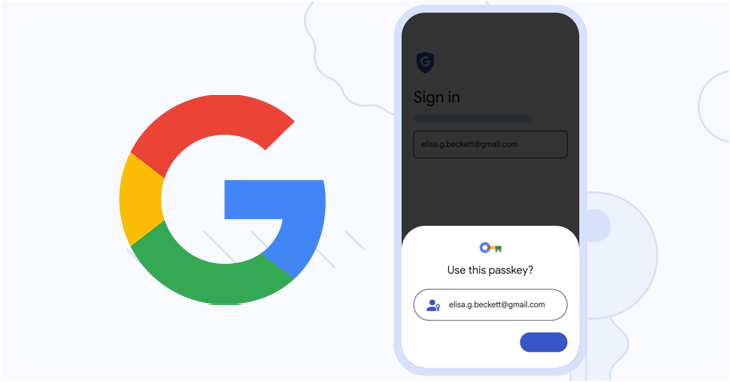Google Introduces Passwordless Secure Sign-In with Passkeys for Google Accounts
Almost five months after Google added support for passkeys to its Chrome browser, the tech giant has begun rolling out the passwordless solution across Google Accounts on all platforms.
Passkeys, backed by the FIDO Alliance, are a more secure way to sign in to apps and websites without having to use a traditional password. This, in turn, can be achieved by simply unlocking their computer or mobile device with their biometrics (e.g., fingerprint or facial recognition) or a local PIN.
“And, unlike passwords, passkeys are resistant to online attacks like phishing, making them more secure than things like SMS one-time codes,” Google noted.
Passkeys, once created, are locally stored on the device, and are not shared with any other party. This also obviates the need for setting up two-factor authentication, as it proves that “you have access to your device and are able to unlock it.”
Users also have the choice of creating passkeys for every device they use to login to Google Account. That said, a passkey created on iPhone will be available on other devices if they are signed in to the same iCloud account.
It’s worth noting that both Google Password Manager and iCloud Keychain use end-to-end encryption to keep the passkeys private.
Additionally, users can sign in on a new device or temporarily use a different device by selecting the option to “use a passkey from another device,” which then uses the phone’s screen lock and proximity to approve a one-time sign-in.
“The device then verifies that your phone is in proximity using a small anonymous Bluetooth message and sets up an end-to-end encrypted connection to the phone through the internet,” the company explained.
Join our webinar and learn how to stop ransomware attacks in their tracks with real-time MFA and service account protection.
Save My Seat!“The phone uses this connection to deliver your one-time passkey signature, which requires your approval and the biometric or screen lock step on the phone. Neither the passkey itself nor the screen lock information is sent to the new device.”
While this may be the “beginning of the end of the password,” the company said it intends to continue to support existing login methods like passwords and two-factor authentication for the foreseeable future.
Google is also recommending that users do not create passkeys on devices that are shared with others, a move that could effectively undermine all its security protections.
A considerable amount of time and effort goes into maintaining this website, creating backend automation and creating new features and content for you to make actionable intelligence decisions. Everyone that supports the site helps enable new functionality.
If you like the site, please support us on “Patreon” or “Buy Me A Coffee” using the buttons below


To keep up to date follow us on the below channels.








![Cobalt Strike Beacon Detected - 166[.]108[.]234[.]74:8089 8 Cobalt-Strike](https://www.redpacketsecurity.com/wp-content/uploads/2021/11/Cobalt-Strike-300x201.jpg)